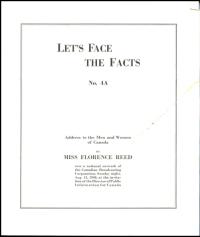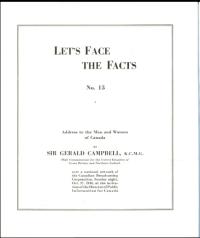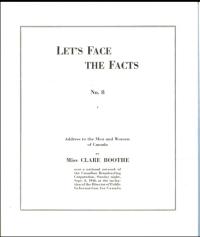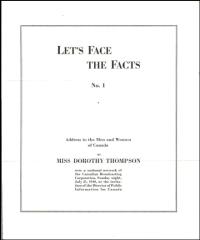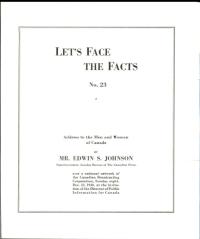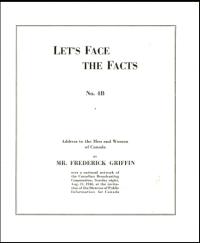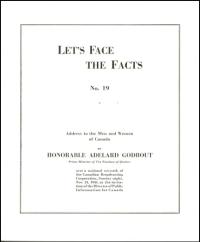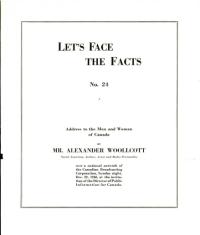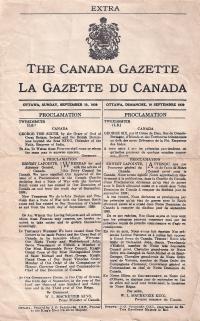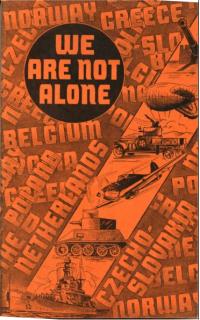Speeches and Broadcasts
Let's Face the Facts - Florence Reed
During the war the CBC became a vital tool of the war effort, presenting a variety of wartime programming aimed at informing and motivating the Canadian public. The "Let's Face the Facts" series presented such speeches by a variety of notable Canadians commenting on different aspects of the war effort. This particular speech was given by Florence Reed, an American actress.
Let's Face the Facts - Sir Gerald Campbell
During the war the CBC became a vital tool of the war effort, presenting a variety of wartime programming aimed at informing and motivating the Canadian public. The "Let's Face the Facts" series presented such speeches by a variety of notable Canadians commenting on different aspects of the war effort. This particular speech was given by Sir Gerald Campbell, the High Commissioner for the United Kingdom of Great Britain and Northern Ireland.
Let's Face the Facts - Clare Boothe
During the war the CBC became a vital tool of the war effort, presenting a variety of wartime programming aimed at informing and motivating the Canadian public. The "Let's Face the Facts" series presented such speeches by a variety of notable Canadians commenting on different aspects of the war effort. This particular speech was given by Clare Boothe, an American magazine writer and author.
Let's Face the Facts - Dorothy Thompson
During the war the CBC became a vital tool of the war effort, presenting a variety of wartime programming aimed at informing and motivating the Canadian public. The "Let's Face the Facts" series presented such speeches by a variety of notable Canadians commenting on different aspects of the war effort. This particular speech was given by Dorothy Thompson, an American journalist and radio broadcaster.
Let's Face the Facts - Edwin S. Johnson
During the war the CBC became a vital tool of the war effort, presenting a variety of wartime programming aimed at informing and motivating the Canadian public. The "Let's Face the Facts" series presented such speeches by a variety of notable Canadians commenting on different aspects of the war effort. This particular speech was given by Edwin S. Johnson, the Superintendant of the London Bureau of The Canadian Press.
Let's Face the Facts - Frederick Griffin
During the war the CBC became a vital tool of the war effort, presenting a variety of wartime programming aimed at informing and motivating the Canadian public. The "Let's Face the Facts" series presented such speeches by a variety of notable Canadians commenting on different aspects of the war effort. This particular speech was given by Frederick Griffin, a Canadian newspaper journalist.
Let's Face The Facts - Adelard Godbout
During the war the CBC became a vital tool of the war effort, presenting a variety of wartime programming aimed at informing and motivating the Canadian public. The "Let's Face the Facts" series presented such speeches by a variety of notable Canadians commenting on different aspects of the war effort. This speech was by Adelard Godbout, Premier of Quebec (1936, 1939-1944).
Let's Face the Facts - Alexander Woollcott
During the war the CBC became a vital tool of the war effort, presenting a variety of wartime programming aimed at informing and motivating the Canadian public. The "Let's Face the Facts" series presented such speeches by a variety of notable Canadians commenting on different aspects of the war effort. This particular speech was given by Alexander Woollcott, a notable American author and critic for the New Yorker.
Canada declares war, 1939
On Sunday, the tenth of September 1939, the government of Canada officially announced that the nation was at war with Germany.
We Are Not Alone
This collection contains testimonies by dignitaries and officials of Allied countries that had suffered major defeats early in the war, including Czechoslovakia, Poland, Norway, Belgium, Greece, and the Netherlands. The goal of such publications was to recount the struggles of these countries, and to remind citizens that these Allies were still fighting and supporting the war effort, albeit in different ways.

